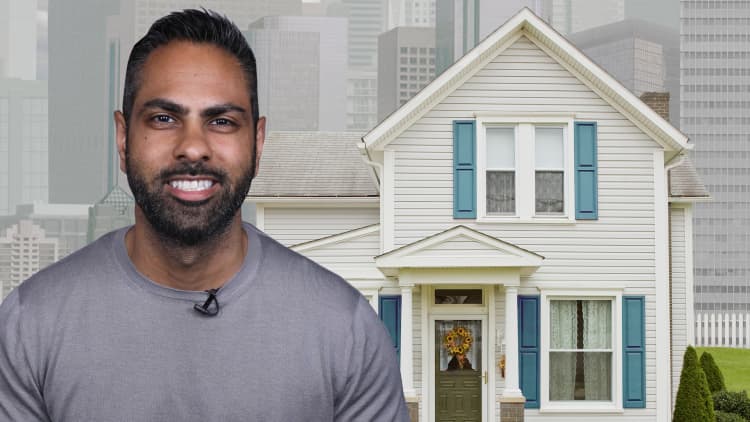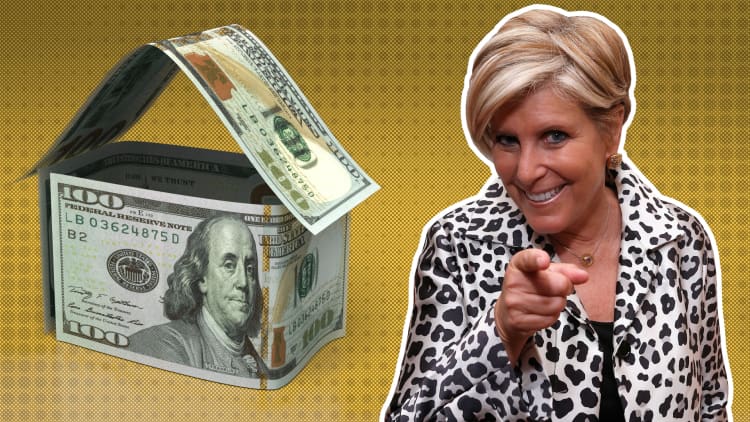It's no secret that many millennials are struggling to buy homes, especially without help. Even, it turns out, older, wealthier millennials.
Nearly one in three older millennials with over $100,000 to invest say they received financial assistance from their parents in order to buy their first home. By contrast, only 15% of comparable Baby Boomers say they had a boost from their parents when making that purchase.
That's according to investment company Ameriprise, which surveyed 453 older millennials, classified here as those ages 30 to 37, and 3,000 adults total, all of whom had at least $100,000 in investable assets. While this was not a large sample of millennials, and respondents were wealthier than average, other studies have found similar results.
"There is more financial support into adulthood than what past generations experienced," Marcy Keckler, vice president of Financial Advice Strategy at Ameriprise Financial, tells CNBC Make It.
Why so many millennials struggle to buy homes
Millennial homeownership has been off to a slow start. Roughly 1 in 3 millennials under the age of 35 own a home as of the end of 2018, according to the U.S. Census Bureau. That's 8 or 9 percentage points lower than previous generations' homeownership rates at ages 25 to 34, according to research from the Urban Institute's Housing Finance Policy Center.
Here are some of the key reasons why.
Rising home costs
In many cities around the U.S., particularly in coastal areas, home prices are out of reach for many millennials. Only 67 percent of homes available in 2018 located in metro areas tracked by Redfin were priced affordably for younger buyers on a budget — down from 71 percent of homes in 2017. In Los Angeles, only 19 percent of homes are in a price range that millennials can afford, based on their median incomes.
"Millennials have seen their rents go up year after year, and may think that buying a home is more affordable, but the fact of the matter is housing has become unaffordable across the board, " says Daryl Fairweather, chief economist at real estate site Redfin.
That means many millennial homeowners end up paying more than they wanted to or had budgeted for, or simply not buying, because there aren't as many homes available at the prices young people can comfortably pay.

Heavier student loan burdens
College costs are also playing a role, Keckler says. In January, researchers at the Federal Reserve found "roughly 20% of the decline in homeownership among young adults can be attributed to their increased student loan debts since 2005."
Pew Research Center found that the number of households with student loan debt doubled from 1998 to 2016. The median amount of loan debt millennials carried was $19,000, significantly higher than Gen-Xers' balance of $12,800.
Stagnating purchasing power
Many Americans of all generations are feeling squeezed, as salaries don't go as far as they once did to cover the necessities. The average paycheck has the same purchasing power it did 40 years ago, Pew Research found.
When adjusted for inflation, the average hourly earnings peaked more than 45 years ago, according to Pew, so a $4.03 hourly wage in 1973 had the same purchasing power that $23.68 would have in 2018.
It's almost like financial independence is just occurring a little bit later.Marcy KecklerVP of Financial Advice Strategy at Ameriprise Financial
But younger adults may be feeling particularly grim. A new report by Merrill Lynch and Age Wave, which surveyed over 2,700 Americans ages 18 to 34, found: 8 in 10 say it's harder to become financially independent for them than previous generations. And 70% of Baby Boomers agree.
"It's almost like financial independence is just occurring a little bit later and I think that's tied to this idea that it's perceived to be harder for the next generation, and parents just want to help out," Keckler says.
What to do if you want to buy
A majority of young people nonetheless expect to own a home at some point: a full 85 percent, according to Aperion Care, which surveyed 2,000 millennials. And that's good news, according to some experts, though not all.
Young people should be prioritizing home ownership, says co-founder of AE Wealth Management and self-made millionaire David Bach. Not buying a home is, in fact, the No. 1 millennial money mistake, he tells CNBC Make It.
Self-made millionaire and star of ABC's "Shark Tank" Barbara Corcoran also encourages homeownership as a goal. "The faster you buy your first home, in my opinion, the better," she says. "You've got to get in the game."
Here are eight steps to follow if you want to buy a home, and here's how to figure out what you can afford. Remember that location matters greatly: Take a look at the 10 best cities for first-time buyers.
Don't miss: 1 in 4 young people dip into 401(k)s to pay off debt—here's why that's a problem
Like this story? Subscribe to CNBC Make It on YouTube!




